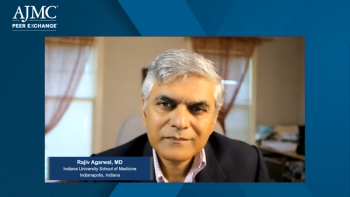
Steps that need to be taken to address unmet needs and optimize outcomes for patients who have chronic kidney disease and type 2 diabetes.

Steps that need to be taken to address unmet needs and optimize outcomes for patients who have chronic kidney disease and type 2 diabetes.

An overview of therapies in the pipeline, including other nonsteroidal MRAs, that show potential in treating patients who have chronic kidney disease and type 2 diabetes.

A panel of clinicians react to limitations surrounding the use of SGLT2 inhibitors for patients with chronic kidney disease and type 2 diabetes.

Where data demonstrated by the FIDELIO-DKD study of finerenone for patients with chronic kidney disease may apply in routine clinical practice.

What to know in terms of the mechanism of action of non-steroidal MRA finerenone compared with other therapies used to treat patients with chronic kidney disease and type 2 diabetes.

George L. Bakris, MD, describes the design and results of the FIDELIO-DKD trial investigating the effect of finerenone on patients with chronic kidney disease.

Therapies used to help treat patients who have chronic kidney disease and type 2 diabetes.

Considerations for establishing balance for the care of patients with chronic kidney disease among all types of care settings.

What better testing strategies and newer quality measures can do to improve patient referrals to nephrologists for earlier intervention of chronic kidney disease.

Key takeaways from the National Kidney Foundation’s new HEDIS and MIPS quality measures for patients with chronic kidney disease and type 2 diabetes.

Various types of health care professionals who may play a role in treating patients with chronic kidney disease, and recommendations to help overcome barriers that impact risk of disease progression and outcomes for patients.

Panelists conclude the discussion with personal insight into the promising future of Alzheimer disease treatment.

Expert panelists consider how to define response to disease-modifying therapies and discuss the threshold for treatment ineligibility due to lack of response.

Strategies that can help clinicians establish and work toward goals when treating patients with chronic kidney disease to help control disease and prevent progression.

A panel of clinicians explain why action is needed to help prevent the risk of progression of chronic kidney disease.

A member of the American Brain Foundation discusses the organization’s role in the development of Alzheimer disease management and improvement in education.

Key opinion leaders discuss possible ways to mitigate the increased cost of Alzheimer disease treatment.

Financial and clinical concerns surrounding the burden of chronic kidney disease progression, as well as social determinants that factor into managing the condition in the community.

Strategies to help clinicians talk with patients about chronic kidney disease staging and what to expect in terms of prognosis.

A discussion on the stratification of patient populations for treatment eligibility based on various decision factors.

Panelists discuss how to craft future policies for early biomarker detection to use developing therapies that target underlying pathophysiology.

Diagnostic criteria and special considerations of nephrologists when assessing patient kidney function and diagnosing chronic kidney disease.

Drs Rajiv Agarwal and Eugene Wright Jr. highlight risk factors associated with chronic kidney disease and react to concerns surrounding the assessment and treatment of patients.

Key opinion leaders consider effective ways to improve access to appropriate care for individuals with Alzheimer disease.

Expert panelists discuss methods to better monitor comorbidities and adverse effects associated with Alzheimer disease.

Experts in the management of Alzheimer disease consider the future goals of therapy in tandem with the development of early detection polices.

A discussion on the typical journey of a patient with Alzheimer disease from initial presentation to proper diagnosis within the health care system.

Key opinion leaders discuss which factors contribute to patients and caregivers deciding to seek health care guidance and assistance for Alzheimer disease.

A discussion on the disparity in access to quality health care between various patient populations.

Experts in the management of Alzheimer disease consider the increased prevalence of Alzheimer disease in the United States with growing geriatric populations and how the health care system is adapting.

Published: April 22nd 2021 | Updated:

Published: May 21st 2009 | Updated:

259 Prospect Plains Rd, Bldg H
Cranbury, NJ 08512
© 2025 MJH Life Sciences®
All rights reserved.
